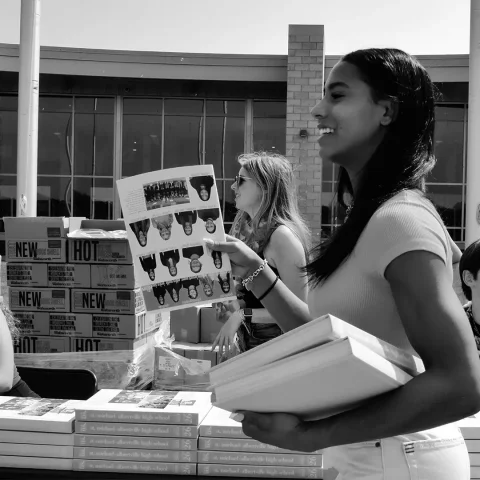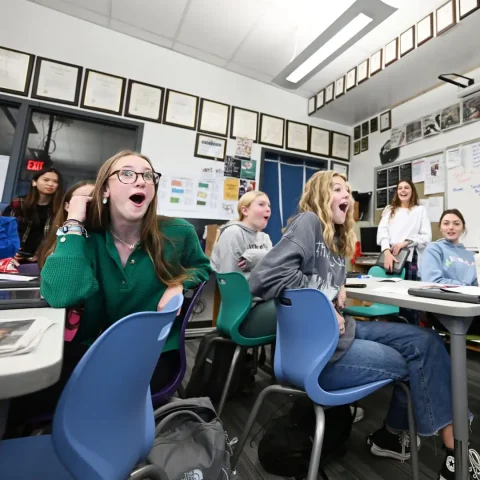WHEN I WAS SITTING IN UNDERGRADUATE CLASSES, ONE OF THE KEY POINTERS THAT PROFESSORS GAVE US FUTURE TEACHERS WAS TO APPRECIATE AND RECOGNIZE THE SUPPORT STAFF IN THE SCHOOLS IN WHICH WE WOULD BE WORKING. AS A TEACHER, I HAVE FOUND THIS TO BE GREAT ADVICE, BUT AS A YEARBOOK ADVISER, IT OFFERS EVEN MORE.
Of course, support staff can prove invaluable during stressful days by helping with scheduling, copying, identification, bookkeeping, facilities, or even a well-stocked candy jar that temporarily relieves the stress, but they also are invaluable resources that are often untapped by student reporters.
The support staff work at the school because they enjoy being around kids, but they often do not have regular interaction with them. They enjoy student interaction, and reporters can help provide this link. The support staff offer new perspectives and a wealth of information that students do not always stop to recognize.
SUPPORT STAFF SOURCES
REGISTRAR
Depending on the size of your school, the registrar may work alone or with several assistants. The registrar can provide statistics regarding enrollment numbers. Due to confidentiality, the registrar typically will not be able to give students’ names, but might find that one graduating class may have an unusual number of twins, triplets or relatives; that the school’s enrollment has certain trends; that the number of transcripts being sent to colleges is increasing; the number of early graduates; and more. The registrar at our school has been here since I was a student at Lincoln-Way High School, and, with her memory, the story ideas and information she comes up with always amazes us.
PRINCIPAL’S SECRETARY
If everything in the school goes through the principal, you can bet that the principal’s secretary always has the inside scoop. From student awards, new programs being developed and new classes, crazy questions that parents might call in to ask, opinions public visitors have, to what the press is saying about the school, the principal’s secretary can clue reporters to events and information that they may not have heard about.
CAFETERIA STAFF
Imagine the conversations and habits of students that the cafeteria staff notices each day. Perhaps they can share random acts of kindness they observed, the eating habits of upperclassmen versus underclassmen, the most habitual customers, and how they can tell when the athletes change diets. They are a great resource for student reporters who are looking for tips on students to interview who may not be involved in school activities and/or sports.
CUSTODIANS
Talk about the dirt! When I want to know what the buzz of the day is, our custodians always know the hot gossip. As long as student reporters remember that gossip isn’t fact, custodians are great tip-givers who can get story ideas going and hot tips on who to interview.
BUS DRIVERS
Ah yes, the friendly folks who see the students just after they have awakened. Bus drivers have stories galore, and often can help tap into students who may not be involved in school activities.
LIBRARIANS
They live for information and school history. They see students and their habits, both academic and social. They can tell student reporters what students are researching, what magazines they are reading (then student reporters can read those for more story ideas), and what they are trying to view on the internet.
ATHLETIC DIRECTOR/SECRETARY
Depending on the size of your school, you may or may not have an athletic secretary, but you most likely do have an athletic director. The director is often the school’s biggest sports fan, and can relive each moment as if it is happening again. The secretary knows all the ins and outs, from stats and scores to water boys and trainers. For athletics, they can always keep you posted on the traditional facts or the small instances that do not make the record books or the papers.
I have come to rely on the support staff because I have identified with each of them as people, and I try to emphasize this and teach it to my staff . In attempting to teach them reporting skills, which truly are life skills, I always emphasize the essential component of personal connections. I find it easier for me to learn about others and retain information from and about them when I connect their information to their personalities, or to a story they have told me that made me feel their emotion. It may sound a bit like a friendship, but that is for a good reason – often a good resource is a friend. When reporters create security and establish trust (as in a friendship) they accomplish more. Resources often contact them, just as a friend might call to tell you something new.
So how do you teach students to create, appreciate and utilize relationships with support staff ?
SECRETS TO SECURING STABLE SOURCES
BREAK THE ICE
Reporters need to introduce themselves to contacts. Personal introductions often work best, as sources can then make a face-to-name connection. Corny introductions often work well, because they increase the chance that the source will remember them. Corny can include a poem, a goofy photo or a gift with a pun. Student reporters should be careful that introductions are made when the source is not extremely busy or preoccupied, and that corny does not cross over into obnoxious.
REACH OUT
At the second contact with the source, the reporter should be the first to share a personal story so that the source will remember them. Students can make their quirks known, and show that they have vulnerabilities, too. Reaching out to others often inspires them to reach back toward you.
ESTABLISH CONSISTENCY
After the reporter establishes a source relationship, they should establish a consistent routine that makes the source a part of their day. It should be a quick hello at some point in the reporter’s daily routine. By making themselves seen daily, the source has the opportunity to share something before they forget it, and will not worry about contacting the reporter, because they know that they will be popping in. Students should be careful, however, to make this a simple hello – always asking if anything is new can become burdensome or nagging.
ASK A FAVOR
As with any relationship, sometimes you need a favor from the other party. This can also model for the source the type of information you are looking for. Examples of simple favors include:
- “Did you hear anything new this week?”
- “Do you know who is in charge of Homecoming?”
- “Could you keep an eye out for anyone who might have bought a new car recently?”
Questions like these can also help the source realize that their information is valuable to you.
RECIPROCATE THE FRIENDSHIP
It is crucial that student reporters respect support staff by respecting their jobs; this can be done by asking what they can do to help them out. Student reporters can offer to make a spiffy sign, letterhead design, or form that relates to their job with their layout design skills.
RECOGNITION
Recognition of a source is crucial. While they are not bribes, attempts at recognition such as thank-you notes, restocking the candy jar and “I thought of you when I read this” clippings can be a bright spot in their day.
As students and adults know, developing relationships takes time. While the relationship may not produce information to write about immediately, with time the relationship will put student reporters in the right place at the right time. However, even if it does not, chances are one of their sources will have been there to tell them about it.



